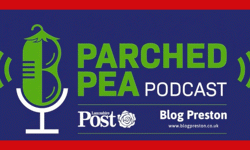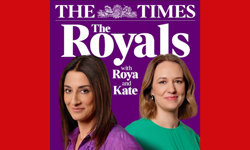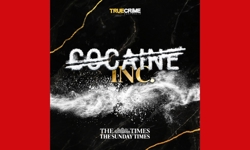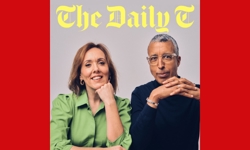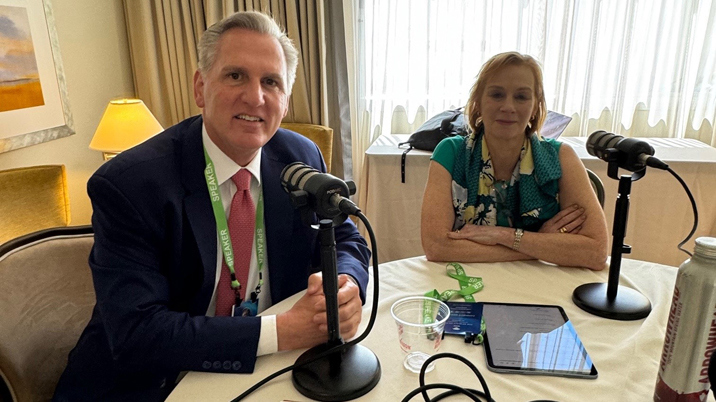
With more voters than ever in history heading to the polls, 2024 is the election year. This makes it a big year for global politics and policy-focused digital news company POLITICO, too, as it pursues its goal of being the global authority on the intersection of politics, policy and power via its magazines, websites, subscription services and, increasingly, podcasts.
Accessible, flexible and diverse, the podcast is a format that’s been warmly embraced by traditional publishers faced with risings costs, slowing subscriptions and growing pressure on circulations and ad revenues in recent years.
As of 2023, there were 465 million podcast listeners worldwide, with the total audience forecast to reach 505 million by the end of this year – a rapid rise (source).
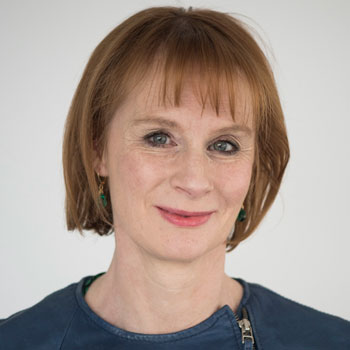
But POLITICO, which is news-driven and digital-first, is no traditional publisher. And it is approaching podcasting not as a handy extra but as part of an integrated strategy interlinking a large and mixed ecology of different verticals, regions, and content formats.
“A lot of publishers still see podcasting as an adjunct,” says Anne McElvoy, POLITICO Europe’s executive editor, who heads multimedia strategy and audio and hosts POLITICO’s weekly trans-Atlantic podcast ‘Power Play’.
“But it needs to be a hub within a publisher closely aligned with product, marketing etcetera, and being audio-first when it best suits. Ours is a ‘one-POLITICO’ kind of mentality powered by joined-up news desks.”
A columnist, broadcaster, and former foreign correspondent, McElvoy joined POLITICO in February 2023 from The Economist, where she had built a podcast unit focusing on the role of new multimedia products in that brand’s expansion and forged US partnerships.
Power Play
Now responsible for all POLITICO podcast output and production in Europe and the UK out of London, she oversees what she calls “the trans-Atlantic bridge joining the dots between the global power centres” – which is where ‘Power Play’ comes in.
Developed by McElvoy and launched globally last September, ‘Power Play’ explores power and how power is changing by providing the people behind it space to explain their thinking.
Each episode includes an interview with a major power player. Interviewees have included US climate envoy John Kerry; Greek PM Kyriakos Mitsotakis; MI6 chief Richard Moore; British PM Rishi Sunak; and Labour party leader Keir Starmer.
A recent edition was recorded in front of a large audience at the White House Correspondents weekend opening party at the British embassy in Washington and included an interview with the British ambassador.
“I do an interview. We then huddle quickly – that’s me; Peter Snowdon, the producer; and Cristina Gonzalez, POLITICO Europe’s executive producer for audio – to figure out where we think the strongest news lines are,” she says, outlining the ‘one-POLITICO’ process.
“One of us writes it into a news story while the podcast is being edited. Then we feed it into the Playbooks (POLITICO’s daily early-morning and weekly email newsletters). We can also give a transcript to breaking news teams, pointing them to the bits we think are very newsy.”
Making waves is one of the aims, McElvoy adds – such as when Shadow Secretary of State for Foreign, Commonwealth & Development Affairs David Lammy’s description of Margaret Thatcher as a “visionary” in a recent ‘Power Play’ interview was widely picked up elsewhere.
Global moments
And an important pillar of this is POLITICO’s so-called ‘global moments’ strategy, which is a POLITICO presence at – and, where possible, active participation in – major power-related events such as the World Economic Forum gatherings at Davos, COPs, and G20 meetings.
The aim is not only to report on but also platform debate, often via POLITICO events. And in recent months, McElvoy and Suzanne Lynch, author of POLITICO’s flagship Global Playbook newsletter, have been developing a joint offering – more ‘one-POLITICO’ thinking.
As POLITICO is a global operation, there is always a news team working, she continues, and with shared real time news lists making what’s coming up visible to all, it’s a system she says works well – and, also, demonstrates POLITICO now growing together as one company.
Launched in the US from Washington back in 2007, POLITICO grew quickly – attracting a reported three million-plus monthly unique visitors within its first year and expanding its operation significantly following the 2008 US presidential election.
In 2014, it partnered with Axel Springer to launch POLITICO Europe. In 2021, the German publisher and media firm acquired the entire business for more than $1bn.
Today, POLITICO spans newspapers (POLITICO and POLITICO Europe); websites (POLITICO.com and POLITICO.EU); subscription services (POLITICOPro.com and POLITICOPro.EU); events and – of course – podcasts.
From its earliest days, POLITICO journalists were encouraged to carry a video camera on assignment and promote their work elsewhere. And the legacy of this foundational multimedia, networking ethos helps explain prioritising podcasting now.
Expansion plans
McElvoy was appointed by Jamil Anderlini, POLITICO’s editor in chief, Europe – whose brief is to expand POLITICO in Europe and the UK – and ultimately reports into POLITICO’s global editor in chief and co-founder John Harris.
“At the time I was approached, the joining up of the European and the American operations and the ambition to scale quickly in the UK, and also multilingually, really appealed to me – as did the buzz of a newsroom-oriented publication active in the daily space,” she recalls.
“I think I’m quite thoughtful in podcasts and columns, but I do love that sense of a news engine room and political stories always move quite fast. I love that there is a strong emphasis here on being scoop-y.”
There were POLITICO Europe podcasts before McElvoy joined – such as ‘EU Confidential’ and ‘Westminster Insider’ – and she is now working to build on these and expand the portfolio.
‘Politics at Jack and Sam’s’, a partnership with Sky hosted by POLITICO’s Jack Blanchard and Sky’s Sam Coates, is one recent addition.
Then in late May 2024, POLITICO launched a German language short-form daily podcast in Germany based on its Playbook newsletter content – a model which, if it tests well, may then be rolled out in local language versions elsewhere.
“We work closely with our product team to iterate what each new podcast product will be. A clear product idea is critical,” McElvoy says. “A POLITICO podcast has to feel connected to the rest of what is very rigorous content, and it has to be fresh, distinctive, smart and sassy.”
POLITICO’s marketing team is also closely involved in podcast new product development.
“If you launch lots of things, there’s always a danger they don’t all hang together,” she continues. “It’s like a Christmas tree – you can’t just have baubles, you need the trunk and branches as well. It’s not just ‘Power Play’, it’s ‘Power Play from POLITICO’.”
Much effort goes into junctions within each format and every episode to ensure clarity and ease of navigation for the audience – which when content is often quite complex and varied is essential.
Throughout, she adds, her aim has been to manage and iterate as part of a more integrated strategy while also innovating – away from traditional pillars of podcasting convention, such as an emphasis on in-studio discussion, male voices, and what she terms “radio DNA”.
“My role is to find the best talent and help grow that talent, and we have leaned into the younger, new generation of smart women now rocking Westminster coverage well and in a way that other podcast publishers are yet to do, I think,” says McElvoy.
“I also try where possible to take the listener to the interviewee by doing interviews remotely.” In the increasingly crowded political podcasting market, both these things help POLITICO podcasts stand out.
“Some think of the podcast market as a cake in which the slices are getting thinner, and it’s a very good point. But it’s also a good argument for being distinctive. And much of this comes down to the presenters and their style and tone,” she explains.
“If people weren’t listening to lots of podcasts, that’s when we’d have a problem.”
For POLITICO podcasts, success is a combination of scoops, alignment with POLITICO’s core mission, audience engagement, steady commercial performance (mainly sponsorship but also some advertising), impact, and innovation.
“We don’t just want to keep up with the podcasting audience, we want to get ahead of it,” says McElvoy.
“I am personally very keen on exploring where AI will emerge as a use case in audio / podcasting, not least to break language barriers. Though I am sure we will still be employing human hosts for a while.”
Until then, she adds, her priorities are to add to POLITICO’s distinctive podcast formats and, in the UK, further build its podcasting profile – two challenges she clearly relishes.
“The great thing about podcasting is that if something is a great idea but not quite the right format, you can work that out if you work closely with the audience – and the podcast audience is really responsive to that,” she adds.
“The difference between premier league podcasters and those who simply do ‘good’ podcasting is the ability to match then exceed the expectations of a listening audience which is getting very sophisticated.
“For me, the joy of podcasting is that while you’re doing really serious topics, the format works best when it feels pleasurable. If I manage to bring a sense of pleasure and enjoyment to POLITICO’s podcasting output then I’d be worth the hire, I think.”
This article was first published in InPublishing magazine. If you would like to be added to the free mailing list to receive the magazine, please register here.





